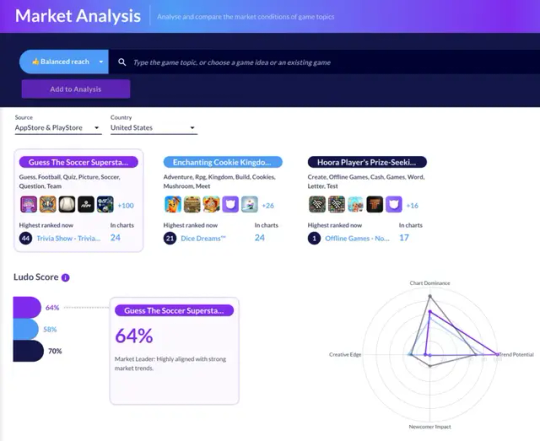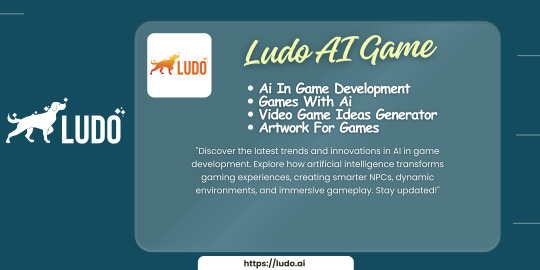Ludo gives developers the world's first AI platform for game concet creation while helping to accelerate and democratize the game design process.
Don't wanna be here? Send us removal request.
Text
AI-based game generators can create unique game concepts by analyzing existing trends, player preferences, and mechanics. These tools provide developers with fresh ideas that can be expanded upon to create engaging and original experiences.
0 notes
Text

Discover the power of the AI Idea Generator, a tool designed to spark creativity and innovation. Whether you're brainstorming for projects, content creation, or new business ideas, this AI-powered tool offers endless possibilities. Unlock fresh and unique concepts effortlessly with the help of the AI Idea Generator today!
0 notes
Text
Unlocking Creativity with the AI Idea Generator: Fun AI Games and Brainstorming Game Concepts
In today’s digital world, the fusion of artificial intelligence (AI) and gaming has opened up a whole new realm of possibilities. Whether you're a game developer, a player, or someone simply interested in game design, the AI idea generator is a game-changer. It serves as an innovative tool to fuel your creative process and spark new concepts for fun AI games, while also helping you to brainstorm exciting game ideas. In this blog post, we will explore how the AI idea generator can enhance your gaming experience and give you a fresh perspective on creating engaging, fun AI-powered games.
What is an AI Idea Generator?
An AI idea generator is an advanced tool powered by machine learning algorithms and data analysis, designed to assist developers, creators, and players in generating unique ideas for games. It uses a vast database of concepts, themes, and existing games to suggest new, innovative ideas based on your input or preferences. By leveraging AI, this tool can offer personalized game concepts, mechanics, narratives, and characters that suit your vision, whether you're a hobbyist looking for inspiration or a developer in search of the next big hit in the gaming industry.
The Rise of Fun AI Games
The gaming industry has seen a dramatic shift towards more immersive, intelligent, and dynamic experiences. Fun AI games are now pushing the boundaries of interactive play, thanks to the ever-evolving capabilities of artificial intelligence. These games are not only fun but also highly adaptive, offering players an experience that reacts and changes in real-time based on their decisions. This dynamic behavior is what makes AI-powered games so engaging and replayable.

Fun AI games can come in various forms, from puzzle-solving challenges to action-packed adventures. Whether it's an AI-driven game that adapts to your playstyle or one that uses procedural generation to create new levels and scenarios, AI is helping game developers bring more engaging content to the market. AI’s potential to create realistic NPCs (Non-Playable Characters) with advanced behavioral patterns also adds to the depth of these games, making interactions with in-game characters more lifelike and interesting.
Examples of fun AI games include titles like The Sims series, where players interact with AI-driven characters, or Left 4 Dead, where AI controls the game's environment and NPCs, reacting to the player's actions to create tension and excitement. These games show how AI can enhance gameplay and make each experience unique.
Brainstorming Game Ideas with AI
One of the most exciting aspects of using an AI idea generator is the ability to brainstorm game concepts in a matter of minutes. Game development often starts with brainstorming, a creative process that involves coming up with ideas for gameplay, storylines, characters, mechanics, and more. However, coming up with original and exciting concepts can sometimes be a challenge. That’s where AI comes in.
AI-powered brainstorming tools take the pressure off creators by suggesting innovative and out-of-the-box ideas. Whether you're stuck in a creative block or simply looking for fresh inspiration, an AI idea generator can provide countless suggestions to help you kick-start your brainstorming sessions. The AI will analyze trends, gaming genres, and user preferences to suggest relevant ideas, which you can then refine and develop further.
For example, you could enter specific keywords like "sci-fi" or "zombie" into the AI idea generator, and it could propose a variety of concepts ranging from survival horror games to futuristic space explorations. The tool can even help generate unique game mechanics, environments, or dialogues, taking your brainstorming session to the next level.
Benefits of AI in Brainstorming and Game Design
The integration of AI into game development and brainstorming has numerous benefits. Here are just a few:
Time-Saving: AI allows you to quickly generate a plethora of ideas, saving valuable time during the initial stages of game development.
Creativity Boost: AI-generated ideas often challenge traditional thinking, helping you explore new creative avenues that might have been overlooked otherwise.
Customization: The AI idea generator can tailor suggestions to your specific needs, offering a personalized touch to your game design process.
Enhanced Gameplay: For players, AI-driven games provide more complex, engaging, and varied experiences, as AI adapts to their playstyle and decisions.
Conclusion
The future of gaming is bright, and AI is playing an integral role in shaping it. Whether you're developing a new game or looking for inspiration for your next fun AI game, an AI idea generator is an invaluable tool for both developers and enthusiasts. By harnessing the power of AI, you can unlock endless possibilities for creative brainstorming and create games that are truly engaging and unique. Embrace the future of gaming and let the AI idea generator guide you toward your next big breakthrough.
0 notes
Text
Brainstorming Game Ideas
Boost your creativity with Brainstorming Game Ideas! Discover unique game concepts, generate fresh ideas, and refine your vision for the next hit game. Whether you’re an indie developer or a hobbyist, unlock endless possibilities with AI-powered brainstorming techniques. Save and share your favorite ideas easily. Start exploring innovative game ideas today! 🚀 #GameDevelopment #IndieGames
0 notes
Text
Ai Games
“Explore the exciting world of AI Games, where artificial intelligence transforms gameplay and enhances player experiences. Discover innovative AI-powered strategies, dynamic game designs, and creative tools shaping the future of gaming. Stay updated on trends, tips, and insights into how AI is revolutionizing the gaming industry. Bookmark now for endless inspiration and updates on AI Games!”
0 notes
Text
Mastering Gameplay Mechanics: The Backbone of Successful Game Design
Gameplay mechanics refer to the rules and systems that govern the interactions within a game. These can include movement, combat, puzzles, resource management, and more. Essentially, they are the core actions and reactions that make up the player's experience. For instance, the ability to double-jump in platformers or crafting systems in survival games are examples of gameplay mechanics that define the player’s interaction with the virtual world.
0 notes
Text
youtube
A step-by-step tutorial showing how to validate your video game concepts with the brand-new Ludo Score system. Rate your game mechanics and designs with AI so you can feel confident knowing your game will be aligned with market trends and marketability.
1 note
·
View note
Text

"Discover the power of Game Analytics to optimize game performance and player engagement. Explore actionable insights, track in-game metrics, and improve user experiences. Stay ahead in the gaming industry with data-driven strategies. Bookmark now for the latest updates, tools, and trends in game analytics and development!"
0 notes
Text
0 notes
Text

Explore the transformative potential of AI in Game Development! Discover how artificial intelligence is revolutionizing game design, creating immersive player experiences, and streamlining development processes. From AI-driven character behavior to procedural content generation, learn how developers are leveraging cutting-edge technology to redefine the gaming industry. Stay updated with trends, tools, and techniques shaping the future of interactive entertainment.
0 notes
Text
Creative Brainstorming Games: Unlocking Fun and Innovative Ideas
Brainstorming is a tried-and-tested technique used to generate innovative ideas, but turning it into a game elevates the process. Creative brainstorming games add structure and fun to what could otherwise be a mundane task. For instance, they can be used to design innovative solutions, develop stories, or inspire new projects.
0 notes
Text
0 notes
Text

Discover the latest insights in Game Research and explore innovative ideas shaping the gaming world. Dive into trends, techniques, and emerging technologies driving game development. Perfect for developers, designers, and enthusiasts looking to stay ahead in the industry. Uncover strategies to create immersive experiences and refine your skills with expert tips and analysis. Start your journey today!
0 notes
Text
youtube
0 notes
Text
0 notes
Text
youtube
A step-by-step tutorial showing how to create a video game concept from scratch, using Ludo.ai's Interactive Game Designer, on the Start Here tab on the front page of Ludo.ai.
0 notes